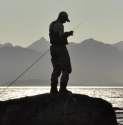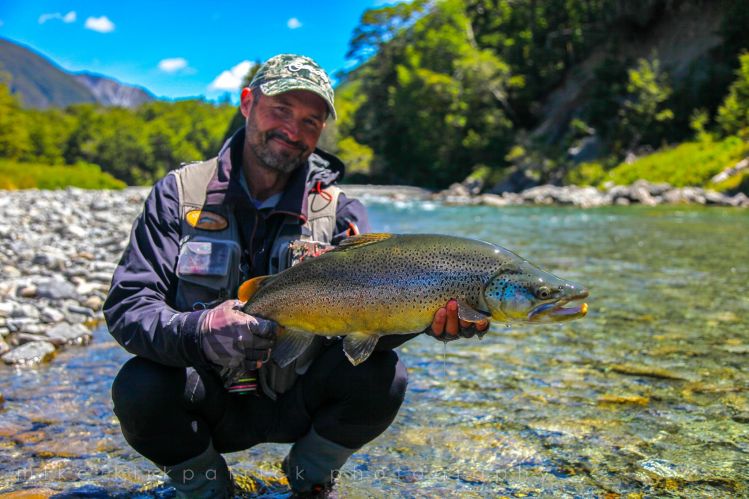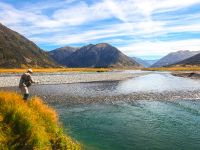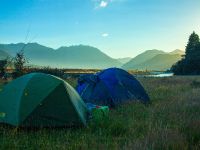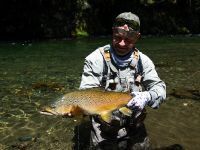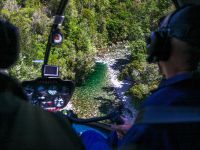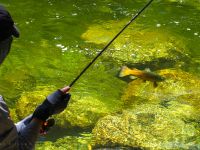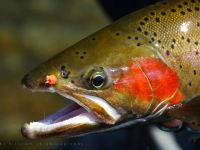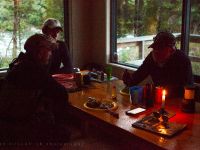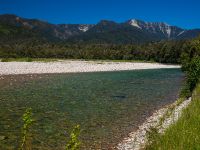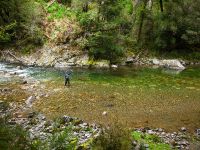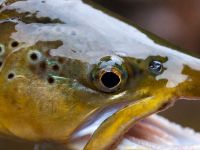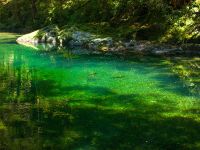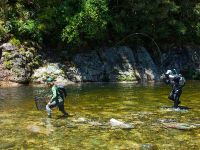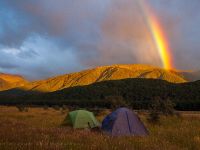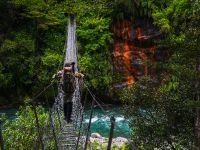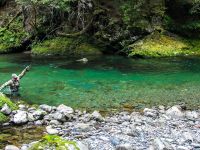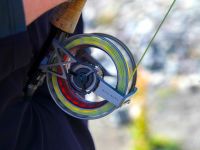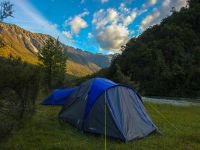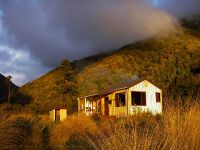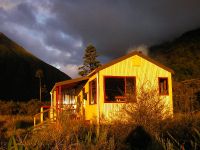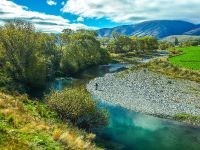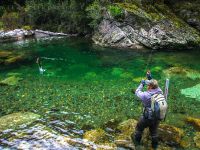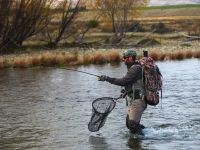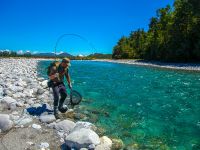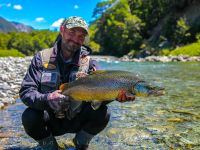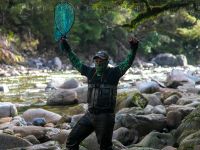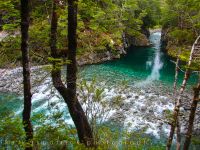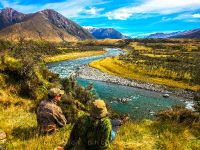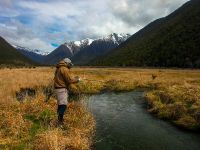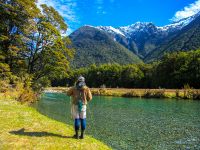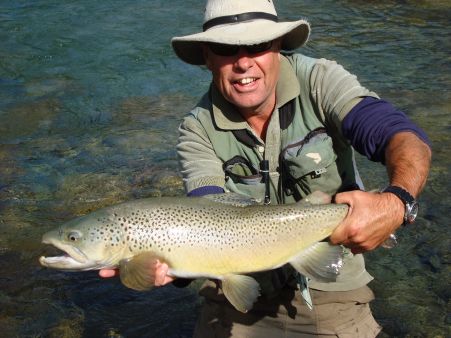Fd: How were your beginnings in fly fishing?
Mike: My life as a fly fisherman started when I was 14 years old, annoying the local estuary population of all manner of fish, including the occasional sea-run brown trout. Once I started working at age 17, I would take my motorbike over a mountain pass to spend my weekends hunting for Deer and progressed to the fly rod and brown trout right away, such were the chances for large fish I was seeing on these trips. I had a real thirst for knowledge, and being completely self-taught, had no limits on either technique or approach, which I carry with me today. I like to challenge convention and write my own story.
Fd: What made you become a professional guide?
I started guiding simply as it seemed a natural progression for me. I owned a small sign writing company, and guiding fit me well as I could take whatever days I wanted off to guide, and initially saw it as a good way to supplement my income and scratch the growing itch to be in nature and its wonderful river valleys.
Latitude Guiding grew until about 15 years ago, when I finally quit my sign writing business to concentrate on what was now a full season of work every year. My wife Nans recently started her own company 'Southern Latitude Guides' to help anglers from around the world with guided fishing - such was the overflow of enquiries we were getting. She works with different guides over the South Island at the moment who are all hand-picked by me for their combination of skill and attitude that represents the qualities we see as vital in a guide here.(www.southernlatitudeguides.co.nz)
Fd: What rivers and spots do you usually fish in?
We're based in the lovely cosmopolitan city of Nelson at the top of New Zealand's South Island, and have access to rivers, lakes and streams anywhere on the Island. I have no real favourite rivers and I guide in over 40 different waterways, with a mind to finding new places every season. As to individual places to fish, I think leaving people to explore for themselves keeps an adventurous tone to the trip while not 'outing' any specific place. This is increasingly important in a growing fishery.
Fd: What would you say to someone who’s thinking about fly fishing in New Zealand for the first time?
If someone was coming to NZ for the first time, my advice would be to ask around or read up to get a feel for what to expect in NZ, because it isn't easy, probably as hard as it gets by world standards. Practice casting long (18+ft) leaders until you can handle them accurately at all distances, particularly short to medium. Hire a guide for at least a day or two, as even one or two small things you'll learn will make the difference between success and failure on your trip. If going more remote, take an epirb (personal locator beacon) and/or a satellite phone, as weather and river levels can and do change quickly here at any time of the year. Be prepared!
Fd: What are the most usual mistakes clients should avoid when fishing over there?
The biggest mistakes clients make, is in their excitement to get casting (to maybe the biggest fish of their lives!) they don't listen carefully enough to the guides instruction as it can be quite specific. Casting too aggressively, wearing inappropriate clothing (too bright in colour, not warm enough), moving too quickly while sight fishing, leaders too short, and not respecting the trout’s space/window are other issues for the new client as well. These all create problems for new anglers that come here. It IS different and requires a unique set of skills for consistent success. A day on the water with a quality guide can and will provide these.
Fd: The best and worst things about the guiding life?
The best thing about guiding is living your passion, as not many get to do what they love day in-day out and make good money from it. You are helping make dreams come true, and the connection with like-minded anglers as their joy grows with each success, is hard to beat.
The worst? Not being able to fish as much as I used to!
Fd: Is there a top 5 for the flies one has to take to New Zealand?
The best flies for NZ is a tough one, as I'm a firm believer in the importance of how you fish the flies over what pattern you use. That said, the ubiquitous slimly tied Hare and Copper nymph is hard to beat as an all rounder, with small parachutes and beetles/terrestrials all working well up top at the right time. Presentation though, is key.
Fd: Right, what about the leader setup and techniques for approaching the pools?
Stealth is the key when approaching trout pools, and long fine leaders are key in the soft presentations needed to avoid 'lighting up' the lateral line and making them instantly suspicious. I tend to lay a trap if they are on a beat or simply lay the fly behind them, with the soft impact causing them to 'feel' then turn and see the fly...
Fd: Are there any destinations you dream about?
I have a yearning to visit Patagonia one day as the culture intrigues me along the variety of fishing options, particularly the large Brookies available there. Slovenia, Russia and Iceland are all on the 'bucket list' as well!
Fd: Any future projects related to fly fishing?
I have a film in mind I'd like to make (given time and the right anglers to do it with) but in the meantime, I'll keep putting out clips on YouTube for others to enjoy as I love filming and the whole editing process. A book about my experiences here is not out of the question either, so watch this space!
Fd: Lastly, what does fly fishing to you?
Fly fishing to me is a jewel in the whole outdoors crown. I love to catch fish, but these days it plays second fiddle to the 'just being there' aspect of it. I love to take photos and shoot movie of what I see, and this has the effect of breaking up the day and keeping everything fresh. I see myself guiding for another decade, after that, who knows!
For more info about Mike Kirkpatrick and Latitude Guiding, please visit his Travel profile here: Travel

